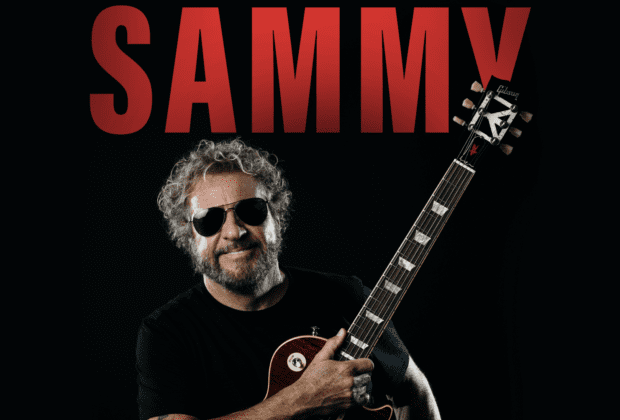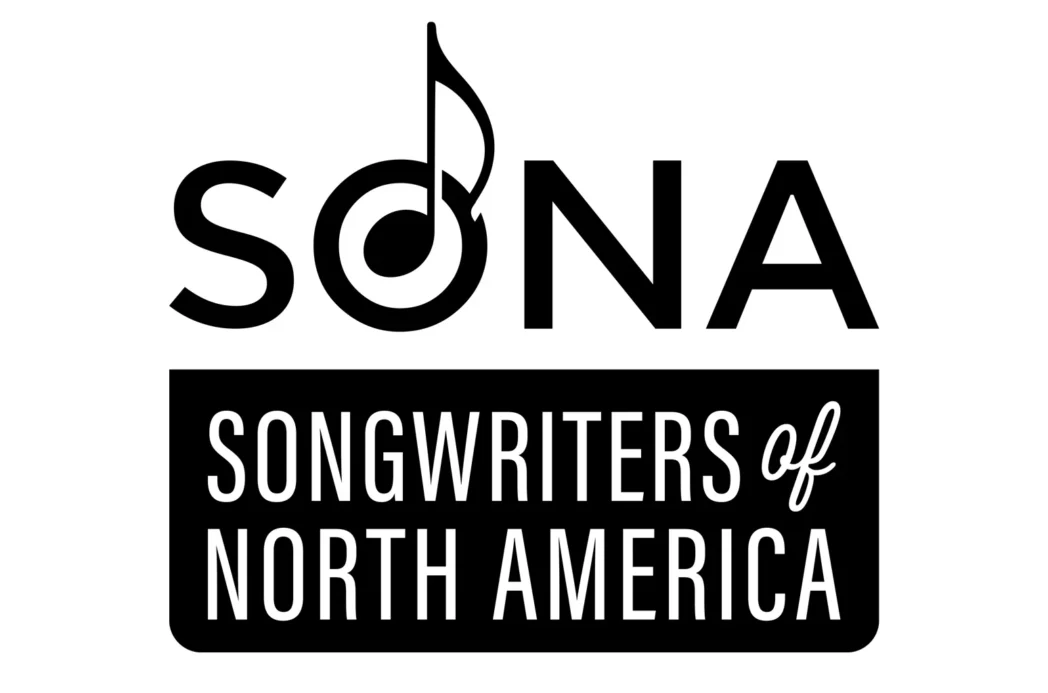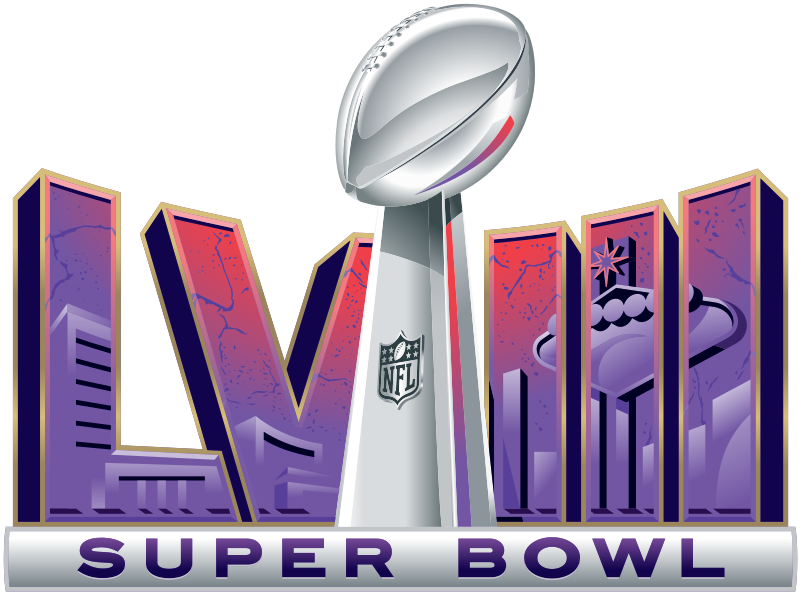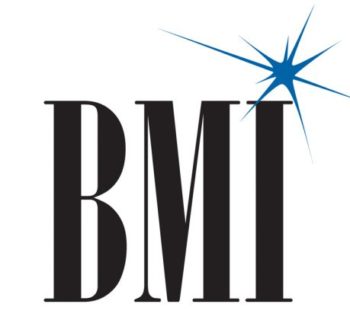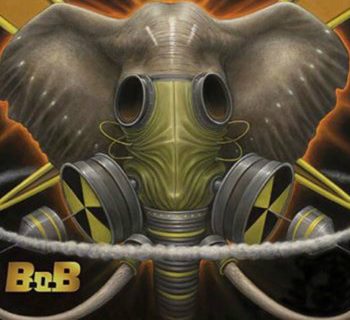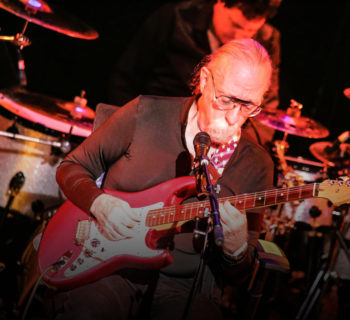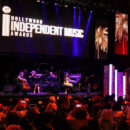FIFTY-ONE YEARS AGO, with Montrose, Sammy Hagar announced he was going to “Rock the Nation,” and he hasn’t stopped since. In fact, you’d be hard-pressed to find an artist who’s had such a consistently busy career as Hagar’s. That’s included a robust solo output (20 studio albums and counting) and tenures with Van Halen and the all-star bands Chickenfoot and HSAN. His primary band, the Circle, is another dream team with Van Halen and Chickenfoot mate Michael Anthony on bass, Jason Bonham on drums and guitarist Vic Johnson, who also played in Hagar’s Waboritas. This year, meanwhile, Hagar has recruited Joe Satriani to join him, Anthony and Bonham to celebrate Van Halen with a Best of All Worlds tour that kicks off July 13. And that’s just the music. Since the launch of his first Cabo Wabo Cantina in 1990, Hagar has started brands of tequila (also called Cabo Wabo), rum, Mezquila and canned cocktails, and last year he launched the Red Rocker Lager beer line (see sidebar). He’s written two best-selling books—the memoir Red: My Uncensored Life in Rock and Sammy Hagar’s Greatest Cocktail Hits—starred in five seasons of Rock & Roll Road Trip with Sammy Hagar on AXS and hosts the syndicated Sammy Hagar’s Top Rock Countdown on more than 90 U.S. radio stations. He also maintains philanthropic work via his Hagar Family Foundation. Hagar has never driven 55, behind the wheel of a car or in front of an audience, and even at 76 he has no plans to start obeying the rules any time soon.
MC: You’re diving deep into the Van Halen part of your catalog this year, which once would have been an ambivalent experience I’m sure. What’s it like to play those songs now?
Hagar: I love it. I love those songs. I’m very proud of them. We made some great records with that band, really special... and people still love ‘em, y’know?
MC: And with Eddie gone now do you feel a kind of responsibility to make sure that music lives on and still gets played on a stage?
Hagar: Y’know, thank God for that music. I remember right after Eddie died and we were doing the birthday shows [on Santa Catalina Island in California]. It was terrible timing; Here we are putting on this big party, celebrating Sammy’s birthday instead of Eddie’s funeral. That felt horrible. But when Mikey and I got onstage and played the first Van Halen song, “Right Now” we had a moment of silence and we looked at each other and it was like, “Oh, man, we’ve got a job to do. We need to keep this music alive. We need to play this song better than we’ve played it in our lives. here we go...” It was so spiritual, just wonderful. That was the healing, right then and there. To know we can never play with Eddie again, that’s the craziest feeling in my head.
MC: There was talk about that maybe happening at the time back then.
Hagar: Even when we were arguing, I knew we would play together again someday. You don’t make music and legacy like that and say, “Nope, that’s it, sorry.” I just knew there would be a reunion. It didn’t happen, but Eddie and I had our own reunion, and that was great.
MC: When did you last connect with him?
Hagar: It was probably around February [2020], before COVID. For Eddie’s birthday [in 2015] I said [via social media], “Hey, happy birthday, dude. I hope you’re good,” and I was sincere. I wasn’t trying to get back in the band or anything like that. And he got back to me, “Oh, thanks, hope you’re doing well, too.” Then my birthday came up, and I didn’t hear from him. (laughs) But then George Lopez was really the guy who instigated this; he was like, “Sam, I was just with Eddie. He’s not doing too good and you need to call him, man. He loves you.” And I was going, “He loves me? I thought he hated me?” and [Lopez] goes, “No, no, he loves you.” OK, gimme his number,” and I just called straight-up. I said, “Ed! I’ve been trying to get ahold of you through your brother, through this person and that person...” I’d say, “Give Eddie this message for me; if he ever feels like wanting to patch it up, call me.” I kept throwing him the ball. And then he finally goes, “Why don’t you just call me?” I said, “that’s what I’m doing, man,” and we just laughed. It worked out beautifully. We were texting like teenagers for the last few months before he died. If it wasn’t for that, I wouldn’t be able to take it.
MC: Your first idea for a Best of All Worlds tour was actually for Van Halen, with both you and David Lee Roth on board. You’ve invited him to make guest appearances with you this year, too. Magnanimous, but... dangerous?
Hagar: With David? (laughs) Yeah [a Van Halen tour] would’ve been a fuckin’ circus again like the Sam and Dave tour was [in 2004]. But it would’ve been good for the fans, man. It would’ve been the best. Dave, he just brings a strange element of trying to take over things and make other people look bad and make himself look good. I hate to say that about the guy, but that’s who he is. He’s always been like that, so it ain’t like he’s changed. I would have no problem with it now because I would be like, “Who cares?” I’m a grown man now. This is silly stuff. But It would’ve been great. I don’t want to put any negative spin on it. I would’ve sucked it up and done it in a second, and I think people would have loved it.
MC: As “a grown man” now, what do you see when you look back at that kid who sang for Montrose all those years ago?
Hagar: That guy was very, very young and green but wanted it bad. I became a solo artist too soon; in Montrose I had a seasoned guy like Ronnie Montrose to guide me, but we got out on tour and bumped heads, so I got thrown out of the band because Ronnie was a hard guy to get along with, God rest his soul, and I was trying to get the other guys to side with me. So as a solo artist I was too green. I didn’t know what I was doing yet. I thought every song I wrote was great. I could care less about fame; it was more important to just sing and play guitar and get out on stage. I wasn’t looking for a free ride; I was, “I’ll get out there and sing until I’m rich and famous. I’ll make it.” But I was young and inexperienced, and then as I got better and realized what the business is and writing better songs... I just matured slowly, but that slow maturing is what made me who I am today. If I would’ve made it in my early 20s and got rich and famous I would probably be burnt out now. A lot of guys that make it overnight don’t last as long as me. But my work ethic made me what I am, so by the time I made it, it was like, “Oh, I enjoy this work. I ain’t trying to make it anymore; I just dig this.”
MC: Alongside the music, where did the famed Hagar business sensibility come from?
Hagar: From being dirt poor growing up. The first money I made my good Italian mom was like, “You gotta save your money! You gotta invest it or you’re gonna end up broke and a drug addict and in jail!” (laughs) So she kind of instilled it in me. I never invested; I don’t like to make money with money. I want to DO something and make money, so I always invested in myself. I did some real estate... and then building the Cabo Wabo in Cabo [San Lucas], that was not a business deal; it was strictly passion. And that turned into an unbelievable business that led to the tequila and the rum and everything else... Everybody thinks I’m smart. I’m not sure I’m that smart (laughs); I’m just a pretty lucky guy and I surround myself with good people.
MC: Because of those extra-musical business interests, a lot of people put you in the same boat—if you will—with Jimmy Buffett. A fair comparison?
Hagar: Oh, sure. I think it’s kind of in your face. The big difference between Jimmy and myself, God rest his soul, is my stuff is in your face and it’s more high-energy, and Jimmy of course was like subliminal music. It was like background music for your relaxation and your party having fun, but it wasn’t all up in your face. People that don’t know either one of us, they get us confused, but we’re not really confusable. It’s just two different styles.
MC: And you were friendly?
Hagar: Of course. He was so kind, man. I can’t say enough about Jimmy. He changed my songwriting. I never wrote songs like that until after I got hip to Jimmy—the songs that are those types of lifestyle songs that I started writing later on. It just influenced my lyrics. I started writing about my life and my lifestyle instead of just rock ‘n’ roll, fast cars and loud music—which is great but [Buffett] certainly expanded my lyrical content, and God bless him for that, man. He was a great songwriter.
MC: You’ve really enjoyed being in the booze industry, haven’t you?
Hagar: There you go—now you hit it. I really do. It’s big fun and it’s creative, as well. It was such a square industry... so a guy like me jumps in and gets so excited about a blend or this or that, a new project, and it’s fun jumping in that game. It seemed like it needed a little shot, and Cabo gave it its first one and now look at all the celebrity brands; there’s got to be, what, 20 tequilas out there with people’s names on them. But nobody did what I did, and I’m doing it again.
MC: Is there a key to doing it “right?”
Hagar: Y’know what it is? We make the product. We own the product. We start it from scratch. We don’t go to some producers and say, “Hey, I want to put my name on your stuff” like everybody else is doing. We invented it. We owned it, from the bottle to the juice in there to the marketing plan. And that’s what’s so rewarding and fun.
MC: A year does not go by when Sammy Hagar isn’t on the road, playing. Where does that drive come from?
Hagar: I feel like I’ve got to tour before my voice goes. I was singing those songs last night with an acoustic guitar, and I’m thinking to myself, “Damn, I can still hit those notes!” I was on a boat with some friends and they were going, “You can still sing those songs?” I’m like, “Fuck yeah I can!” But I don’t know for how long, so I better get out there and give my fans a little treat before I can’t do it anymore.
MC: Is that something you’re really concerned about?
Hagar: So far I can do it, but I know there’s gonna come that day—everyone can tell ya—when, “Man, I can’t sing that anymore.” I feel like some kind of semi-superhuman being or something because I shouldn’t be able to sing like I do. I really shouldn’t. I’ve abused my voice my whole life, screaming and yelling and singing—not with drugs and alcohol, not cigarettes, anyway. Alcohol, a little bit of drugs but not cigarettes or weed. But I’ll tell ya, the more I sing the stronger it is. If I don’t sing and then went on tour and tried to sing five nights a week, a two-hour show, that would not be good. I’d start losing my top range and I’d get really hoarse and start sounding more gruff—and I sound gruff enough at my age now. I like the scruffy voice, but... I just think giving it proper rest, but don’t let it get out of shape. It’s like an athlete, like boxers when they take two years off. Muhammed Ali, the greatest fighter of all time, he took a couple years off and came back and was never the same. I know so many singers who take so much time off and they come back and can’t sing. They open their mouth and it’s not there and then you’re head goes, “I’m done! I can’t sing anymore.”
MC: Do you have a technique for keeping your voice strong?
Hagar: I stay in shape, that’s all. I go down to my basement and crank up my Les Paul and a little Marshall and I scream my ass off a couple times a week. (laughs) I recommend that to everybody. Just don’t take too much time off.
MC: What are the hardest of your songs to sing now?
Hagar: Oh, the damn Van Halen stuff. Because I didn’t play guitar I didn’t care what key they were in; I just sang and then I picked up a guitar and was like, “What the fuck? I can’t hit that note” and Eddies’ going, “Well, you just hit it...” (laughs) But, like, “Dreams,” a song like, “When It’s Love,” that chorus—(sings) “I can’t tell you but it lasts forever.” Every now and then you slip around that a little bit, but I can do it.
MC: Losing these people, whether it’s Jimmy or Eddie or whoever, does it put a little more rocket fuel behind you to keep doing it and maybe do more while you’re still here?
Hagar: No. I mean, these people dying around me make me look at my mortality, but I’m so damn driven that I don’t need any more motivation. My wife’s trying to close my fuel factory over here; she says, “Look, you gotta stop and enjoy life.” I said, “I’m enjoying life.” This brings me joy, to have an idea. The creativity is all it is for me. It isn’t the money. It was at one time; when I was broke on my ass, I wanted to make money. But once you get enough money, then you’ve got to figure out what really makes you happy— and it’s not money. And I hate to say that to somebody who’s struggling. It will make your life easier to have money if you’re struggling, but it’s not gonna make you happy unless you know what to do with it. And what makes me happy is having an idea, whether it’s a song or a beer or whatever, and seeing it through and seeing it win and seeing my fans happy with me, seeing my cantinas full, seeing my tequila and my rum fly off the shelves and stuff like that. And just seeing the audiences at my shows singing along with me, every word to the song. That friggin’ makes me happy, and that’s all you can get.
MC: So what effect has looking at mortality had on you?
Hagar: It’s like when I wrote the song “Father Time” that was on the Crazy Times record...At my age I’m looking at how many years I’ve got left, and so I’m still driven and I’m gonna get ‘em all done, but I’ve got to start to prioritize a little bit, not taking awhile to swing as something but do something I feel I can get done and it won’t make my life too complicated. My time’s spent on the beach, at the dinner table and creating, and that’s it—boom, boom, boom, boom, boom. That’s everything.
MC: Does it impact the kinds of songs you write, too?
Hagar: Absolutely. I think any artist my age that just goes out and writes silly pop songs—unless it’s a really good one, like Paul McCartney would write, or Paul Simon—but an average rock guy like myself, I’m sorry, I don’t want to write about “I Can’t Drive 55” and “One Way to Rock” right now. I don’t mind singing them on stage, but to sit down and write that song again, I just don’t’ feel it in my heart. I want to go into my head and into my soul more.
MC: What have you been working on recently?
Hagar: Musically right now I’ve been on a real cool kinda streak. I wrote a couple of blues songs for Joe Bonamassa. I’ve known him a long time, little by little; we’re not great friends or anything, but I wrote this song and I thought, “God, this is just such a good, real blues song.” It’s called “Fortune Teller Blues,” and I thought, “Who can I give this to? Billy Gibbons? Nah; I love ZZ Top, but they’re more rock-blues. I need a more traditional blues guy, like Robert Cray or someone like that.” And then I thought, “I’m gonna send it to Joe,” and he got back in 10 minutes and said, “I love this song. Can I do it?” And I said, “Absolutely” and we did a duet on it and now I’ve written another one like that. I’m writing more like Jimmy Buffett, but with a blues twist instead of a lifestyle twist, which is kind of interesting. I don’t know if I’m gonna make a record or not, but I’ll get around to it some day, I think.
MC: It’s not like you have to put out an album every year like you once did.
Hagar: I’m not driven to do a record again. I lose a few hundred thousand dollars every time I make a record these days. I don’t mind that, but I have to really be in a mood to go in and record. But I’ve been in a mood for writing, and I’ve been writing some really cool stuff and it’s gonna drive me crazy eventually, and I’ll go in and make a record—no matter what I say. (laughs)
Contact info@redrocker.com for more
CHEERS TO THE RED ROCKER
SPIRITS HAVE BEEN an integral part of Sammy Hagar’s entrepreneurial spirit over the years.
He started during the late ‘90s with Cabo Wabo tequila (sold to Gruppo Campari for a reported $80 million in 2007), then continued with Sammy’s Beach Bar Rum (in partnership with Rick Springfield), Santo Spirit with food celebrity Guy Fieri and Sammy’s Beach Bar Cocktail Co.— along with restaurants and nightclubs in Mexico and other locations.
Now the Red Rocker is in the beer business—which is something he’s long wanted.
Last October, Hagar formally launched Red Rocker Lager in partnership with the Detroit-based Red Rocker Detroit brewery. “I tried to make beer first,” notes Hagar. “My fans back in the ‘80s, when I was in my heyday, were beer drinkers, man. They didn’t know nothing about tequila. I’ve been trying to make beer forever.”
Hagar’s opportunity finally came about four years ago, when businessman Eric Schubert, who at the time was developing an app-based on-demand delivery service and looking for partners. He reached out through channels to Hagar, who proposed doing it with beer. “They came to me,” Hagar recalls, “and I said, ‘For a beer? Hell yeah! American made? Double hell yeah! Made in Detroit, triple hell yeah!’ It just felt right to me.”
Red Rocker Lager is being brewed in Detroit’s historic Corktown neighborhood by Schubert’s son Cameron, who worked with Hagar to perfect the recipe. The company describes it as “golden, medium-bodied... light, crisp and refreshing, with just a touch of sweetness,” and Hagar likens it to the original recipe used by the Mexican brewing company Modello.
The Lager has been in production, quietly, for about a year, and Eric Schubert estimates it will be available in several states by the summer. “I’m real proud of it,” Hagar says. “It’s not like this just came out of the woodwork in the last week or so. I’ve been working on this for frickin’ over 20 years, before I made tequila. So it’s about time.”
Don’t, however, expect Hagar to write a song for the Lager like he did with “Mas Tequila” back in 1999.
“I think pretty much all my songs fit with beer—with any booze,” Hagar explains with a laugh. “I write songs for driving in cars—which is not symbiotic with drinking. But if you get an a convertible, the top down and crank up some of my music—‘Badmotorscooter,’ ‘One Way to Rock,’ ‘Heavy Metal’—those are car songs. And if you’re sitting in a bar or a pub or your backyard having a barbecue, the music works good, too, with beer and food.
“I’m pretty versatile,” he adds. “My music touches on a lot of angles. My lyrics and my lifestyle, it goes pretty good with everything.”

